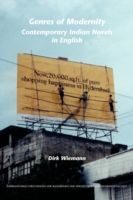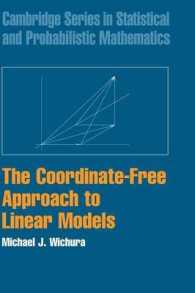- ホーム
- > 洋書
- > 英文書
- > Psychology
Full Description
This volume aims at further articulating and developing the cultural psychological interest in community. It focuses on the processes through which individuals constitute communities and the processes that restrain or enable moving forward with others. This interest is necessary especially now that the world is on the move. Economic crises, political crises and ecological crises have led to reinforced migration patterns, a rise in authoritarianism and xenophobia, and have become a threat to the survival of the world as we know it, particularly to minorities and indigenous communities. At the same time, we are witnessing the birth of new networks, dialogues and actions, generated by people within, between and among communities. Therefore, this volume collects interdisciplinary theoretical, empirical and applied contributions enabling engagement with communities in cultural psychology. This involves both reflections on meaning-making processes and projections on how they feed into social transformation, in exchange with community psychology, anthropology and sociology.
People vitally depend on community to effectively negotiate or resist in complex intercultural or intergroup settings. In the wake of human rights violations or to prevent further damage to the environment a community is needed to undertake action. From feminist movements and disability activism to the otherwise marginalized: how do people constitute communities? How do they resist as a community? How can cultural psychology contribute not only to understand meaning-making processes, but also connect them to processes of social transformation?
Migration, moving through and connecting to different communities can affect meaning making in significant ways. People consider themselves as members of one or another community, but they also increasingly enter into new settings of social practice with new means for action. How might creative meaning-making build bridges between communities? How might new community arise in between or with others? How can cultural psychology deal with intercultural processes without reifying different cultures?
These are the central questions that the, mostly emerging, scholars from many corners of the world address in this book. Their research addresses different institutional settings that are resisted and transformed from within, in dialogue with others. From social work, NGOs and municipal activity to university talent mobility and art projects for youth. Other settings are newly inhabited, from the public square and the social media to a foreign city and neighborhood church. Thus, more communities appear on the map of cultural psychology.
Contents
Series Editors' Preface—Creating Cultural Psychology of Community: What Is Needed?
Acknowledgments.
Chapter 1. Introduction: The Tensions and Transformations of Moving in Communities; Susanne Normann and Floor van Alphen.
Section I. Resistance Or Transformation Within, Towards And From Communities.
Chapter 2. Constituting Childbirth Activism in Argentina: A Study of Place, Identity, and Emotions; María Fernanda González.
Chapter 3. The Performative Momentum of the Hashtag: An Examination of the #MeToo Movement; Andreas A. Andersen and Nikolai S. K. Lybæk.
Chapter 4. Meaning Making Processes in a Professional Community of Social Workers; Line Søberg Bjerre.
Chapter 5. Making Meaning of Disability in Residents' Meetings for Municipal Welfare Policy; Masakuni Tagaki.
Chapter 6. Maneuvering Around Conflicts Between International Development NGOs and Local Communities Toward Poverty Alleviation in Ghana; Seth Amofah.
Chapter 7. Restoration of Purpose: A Goal-Focused Approach to Cultural Transformation and Well-Being Promotion Among Marginalized Communities; David Krzesni and Simon Coulombe.
Chapter 8. Commentary—Experiencing Change: Interrelations Between Individual and Social Transformations; Sarah H. Awad.
Section II. Meaning Making In Between Different Communities.
Chapter 9. Recognition as a Catalyst for Agency: Experiences From an Intercultural Art Project for Young People; Hildegunn Marie T. Seip.
Chapter 10. The Migration Project: Studying the Narrative Construction of Migrant Mobility in a Nonlinear Way; Eva Céspedes and Floor van Alphen.
Chapter 11. Exploring the Tensions and Possible Transformations in Talent Mobility to Estonian Universities; Muhammed Abdulai.
Chapter 12. Self-Expansion Through Proculturation: Semiotic Movement Toward Curvilinear Development; Vladimer Lado Gamsakhurdia.
Chapter 13. Apart From Being Taught, You Teach Yourself: Appropriation and Religious Trajectories Among Children and Youth in a Toba/Qom Neighborhood of Buenos Aires; Mariana García Palacios.
Chapter 14. Commentary—Cultural Psychology, Communities, and the Construction of Excluding Spaces: The Production of Foreigners; Danilo Silva Guimarães.
About the Contributors.








